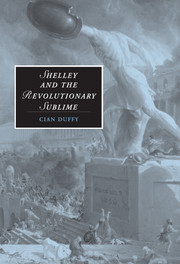Book contents
- Frontmatter
- Contents
- Acknowledgements
- Note on texts
- List of abbreviations
- Introduction: Approaching the ‘Shelleyan sublime’
- 1 From religion to revolution, 1810–1813
- 2 Cultivating the imagination, 1813–1815
- 3 Mont Blanc and the Alps, 1816
- 4 Writing the revolution: Laon and Cythna (1817)
- 5 ‘Choose reform or civil war’, 1818–1819
- Conclusion: ‘Good and the means of good’, 1822
- Notes
- Bibliography
- Index
- CAMBRIDGE STUDIES IN ROMANTICISM
Conclusion: ‘Good and the means of good’, 1822
Published online by Cambridge University Press: 15 December 2009
- Frontmatter
- Contents
- Acknowledgements
- Note on texts
- List of abbreviations
- Introduction: Approaching the ‘Shelleyan sublime’
- 1 From religion to revolution, 1810–1813
- 2 Cultivating the imagination, 1813–1815
- 3 Mont Blanc and the Alps, 1816
- 4 Writing the revolution: Laon and Cythna (1817)
- 5 ‘Choose reform or civil war’, 1818–1819
- Conclusion: ‘Good and the means of good’, 1822
- Notes
- Bibliography
- Index
- CAMBRIDGE STUDIES IN ROMANTICISM
Summary
On 15 February 1821, Shelley wrote to Peacock expressing the ‘greatest possible desire to break a lance with [him], within the lists of a magazine, in honour of [his] mistress Urania’ (Letters, ii, p. 261). This ‘desire’ was prompted by Peacock's ‘essay against the cultivation of poetry’, which Shelley had just read (Letters, ii, p. 244). Drawing heavily on French Enlightenment rationalism, Peacock's Four Ages of Poetry links poetry – as the product of the imagination – to primitivism and political reaction. Peacock accepts that ‘poetry was the mental rattle that awakened the attention of the intellect in the infancy of civil society’, but insists that ‘it cannot claim the slightest share in any one of the comforts and utilities of life of which we have witnessed so many and so rapid advances’. ‘Poetry’ was devised, he maintains, to ‘disseminate the fame’ of tyrants, and quickly became a vehicle for the ‘rude’ and ‘multifarious’ ‘chimeras’ of the imagination. ‘[A]s the sciences of morals and of mind advance towards perfection’, he continues, ‘as reason gains ascendancy in them over imagination and feeling, poetry can no longer accompany them in their progress’. ‘A poet in our times’, Peacock concludes, is an anachronism: ‘a semi-barbarian [whose] ideas, thoughts, feelings, associations, are all with barbarous manners, obsolete customs, and exploded superstitions’.
Shelley responded to these ‘anathemas’ – which re-deploy much of his own terminology – with his Defence of Poetry, composed in February and March 1821 (Letters, ii, p. 261).
- Type
- Chapter
- Information
- Shelley and the Revolutionary Sublime , pp. 187 - 201Publisher: Cambridge University PressPrint publication year: 2005

